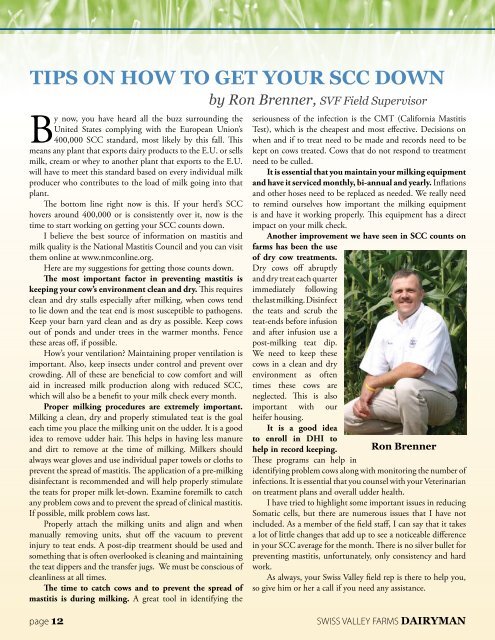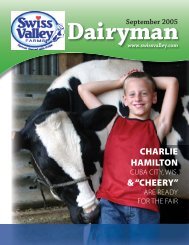dairy case managers get 'up close' with the cows - Swiss Valley Farms
dairy case managers get 'up close' with the cows - Swiss Valley Farms
dairy case managers get 'up close' with the cows - Swiss Valley Farms
Create successful ePaper yourself
Turn your PDF publications into a flip-book with our unique Google optimized e-Paper software.
TIPS ON HOW TO GET YOUR SCC DOWN<br />
By now, you have heard all <strong>the</strong> buzz surrounding <strong>the</strong><br />
United States complying <strong>with</strong> <strong>the</strong> European Union’s<br />
400,000 SCC standard, most likely by this fall. This<br />
means any plant that exports <strong>dairy</strong> products to <strong>the</strong> E.U. or sells<br />
milk, cream or whey to ano<strong>the</strong>r plant that exports to <strong>the</strong> E.U.<br />
will have to meet this standard based on every individual milk<br />
producer who contributes to <strong>the</strong> load of milk going into that<br />
plant.<br />
The bottom line right now is this. If your herd’s SCC<br />
hovers around 400,000 or is consistently over it, now is <strong>the</strong><br />
time to start working on <strong>get</strong>ting your SCC counts down.<br />
I believe <strong>the</strong> best source of information on mastitis and<br />
milk quality is <strong>the</strong> National Mastitis Council and you can visit<br />
<strong>the</strong>m online at www.nmconline.org.<br />
Here are my suggestions for <strong>get</strong>ting those counts down.<br />
The most important factor in preventing mastitis is<br />
keeping your cow’s environment clean and dry. This requires<br />
clean and dry stalls especially after milking, when <strong>cows</strong> tend<br />
to lie down and <strong>the</strong> teat end is most susceptible to pathogens.<br />
Keep your barn yard clean and as dry as possible. Keep <strong>cows</strong><br />
out of ponds and under trees in <strong>the</strong> warmer months. Fence<br />
<strong>the</strong>se areas off, if possible.<br />
How’s your ventilation? Maintaining proper ventilation is<br />
important. Also, keep insects under control and prevent over<br />
crowding. All of <strong>the</strong>se are beneficial to cow comfort and will<br />
aid in increased milk production along <strong>with</strong> reduced SCC,<br />
which will also be a benefit to your milk check every month.<br />
Proper milking procedures are extremely important.<br />
Milking a clean, dry and properly stimulated teat is <strong>the</strong> goal<br />
each time you place <strong>the</strong> milking unit on <strong>the</strong> udder. It is a good<br />
idea to remove udder hair. This helps in having less manure<br />
and dirt to remove at <strong>the</strong> time of milking. Milkers should<br />
always wear gloves and use individual paper towels or cloths to<br />
prevent <strong>the</strong> spread of mastitis. The application of a pre-milking<br />
disinfectant is recommended and will help properly stimulate<br />
<strong>the</strong> teats for proper milk let-down. Examine foremilk to catch<br />
any problem <strong>cows</strong> and to prevent <strong>the</strong> spread of clinical mastitis.<br />
If possible, milk problem <strong>cows</strong> last.<br />
Properly attach <strong>the</strong> milking units and align and when<br />
manually removing units, shut off <strong>the</strong> vacuum to prevent<br />
injury to teat ends. A post-dip treatment should be used and<br />
something that is often overlooked is cleaning and maintaining<br />
<strong>the</strong> teat dippers and <strong>the</strong> transfer jugs. We must be conscious of<br />
cleanliness at all times.<br />
The time to catch <strong>cows</strong> and to prevent <strong>the</strong> spread of<br />
mastitis is during milking. A great tool in identifying <strong>the</strong><br />
by Ron Brenner, SVF Field Supervisor<br />
seriousness of <strong>the</strong> infection is <strong>the</strong> CMT (California Mastitis<br />
Test), which is <strong>the</strong> cheapest and most effective. Decisions on<br />
when and if to treat need to be made and records need to be<br />
kept on <strong>cows</strong> treated. Cows that do not respond to treatment<br />
need to be culled.<br />
It is essential that you maintain your milking equipment<br />
and have it serviced monthly, bi-annual and yearly. Inflations<br />
and o<strong>the</strong>r hoses need to be replaced as needed. We really need<br />
to remind ourselves how important <strong>the</strong> milking equipment<br />
is and have it working properly. This equipment has a direct<br />
impact on your milk check.<br />
Ano<strong>the</strong>r improvement we have seen in SCC counts on<br />
farms has been <strong>the</strong> use<br />
of dry cow treatments.<br />
Dry <strong>cows</strong> off abruptly<br />
and dry treat each quarter<br />
immediately following<br />
<strong>the</strong> last milking. Disinfect<br />
<strong>the</strong> teats and scrub <strong>the</strong><br />
teat-ends before infusion<br />
and after infusion use a<br />
post-milking teat dip.<br />
We need to keep <strong>the</strong>se<br />
<strong>cows</strong> in a clean and dry<br />
environment as often<br />
times <strong>the</strong>se <strong>cows</strong> are<br />
neglected. This is also<br />
important <strong>with</strong> our<br />
heifer housing.<br />
It is a good idea<br />
to enroll in DHI to<br />
help in record keeping.<br />
These programs can help in<br />
Ron Brenner<br />
identifying problem <strong>cows</strong> along <strong>with</strong> monitoring <strong>the</strong> number of<br />
infections. It is essential that you counsel <strong>with</strong> your Veterinarian<br />
on treatment plans and overall udder health.<br />
I have tried to highlight some important issues in reducing<br />
Somatic cells, but <strong>the</strong>re are numerous issues that I have not<br />
included. As a member of <strong>the</strong> field staff, I can say that it takes<br />
a lot of little changes that add up to see a noticeable difference<br />
in your SCC average for <strong>the</strong> month. There is no silver bullet for<br />
preventing mastitis, unfortunately, only consistency and hard<br />
work.<br />
As always, your <strong>Swiss</strong> <strong>Valley</strong> field rep is <strong>the</strong>re to help you,<br />
so give him or her a call if you need any assistance.<br />
page 12<br />
SWISS VALLEY FARMS DAIRYMAN
















